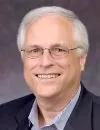While at Camp Liberty in Baghdad in 2005, Scott Lynch’s wife Monica, an Army JAG officer, was issued body armor that was not designed for women. It eventually caused Femoral Acetabular Impingement, a painful condition that affects mobility. Monica underwent major surgery in 2009 for the condition. Post-deployment, she returned home to battle with debilitating physical and mental health issues.
Lynch gave up his job to care for his wife full-time. Now, Lynch—a student at University of Maryland Global Campus (UMGC)—has earned an MBA at Ramstein Air Base in Germany through UMGC’s Pillars of Strength Scholarship program, created for caregivers of recovering servicemembers and veterans.
When he received a Pillars of Strength scholarship in 2023, it marked the first year that scholarships went to men: two husbands who cared for their wives, a brother who cared for his sister and a son who grew up helping his mother.
Lynch and Monica have known each other since high school, when they often shared a seat on the school bus in West Palm Beach, Florida. After graduation, they went their separate ways—Lynch to study environmental engineering and Monica to join the Army after law school—but they kept in touch over the years.
Their romantic relationship developed after Monica was injured. Lynch talked about it in an interview after he received the scholarship.
“The girl I shared the bus seat in high school with was mentally struggling and could barely walk,” he recalled. “When I realized that sleepless nights, constant anxiety, anger and memory loss would become our regular way of life, I knew that we needed help. I was either going to lose the person I deeply loved or we were going to fight for recovery. We chose to fight.”
Lynch’s full-time caregiving has enabled Monica to work as an attorney for the Department of the Army. The couple has moved from base to base, including to Hawaii, Florida, Texas, Washington, D.C., and now Germany. In an interview at Ramstein after receiving his degree, Lynch said gender barriers were the biggest challenges he and Monica had to manage after she returned from combat and reintegrated into society with her husband as her caregiver.
“We had to break the traditional gender roles,” he said. “I'm very proud to have served this role for my family, to dedicate time at home raising young children, while continuing my professional development.”
At first, Lynch tried to keep up with his environmental career, managing watersheds and natural resources from Hawaii to Florida while employed by local nonprofits and government organizations. But he soon had to give up paid employment to help Monica and to raise their two sons, now 11 and 14.
Volunteer work on environmental issues has allowed him to stay connected to work that is important to him, while also providing the flexibility he needed to care for his family.
“Volunteerism fills a bucket in a very different way, because you serve expecting nothing or minimal input from your community. You serve with the passion and the desire, knowing that you're changing the world for the better,” Lynch said. “You're educating youth, you're serving your mission. This is one of the simplest and purest forms of an act of kindness and joy, and it has really served me well while being able to stay at home and care for myself and Monica.”
With decades of professional experience in environmental engineering, he pursued his MBA to hone in on leadership skills, project management, digital transformation and business development in a modern-day setting. He said help from the Pillars of Strength community in both the United States and Europe was essential in his completion of the degree. “The uplifting part for me was the dedication and perseverance of my classmates and my colleagues at the school,” he said. “Without them, I would not be as challenged, and the degree would not be as fulfilling as it is today.”
Being recognized with a Pillars of Strength Scholarship, he said, made him realize his value to society as part of the home front caretaking team for combat-disabled veterans, especially women.
“To know that there's a school, a scholarship program and a community that supports and encourages my growth through education is … just simply amazing,” he said.
His advice to other caretakers? Don’t give up.
“There are times where our light is dwindling. We feel we're in the dark, we're down in a corner and we're running out of air,” he said. But, he added, “we're not alone.”
“You're all in it together, to dig deep, to go down into your soul and not let that flame go out. And it begins to get stronger, and it builds upon itself until you reach a point where there's no turning back. You not only represent yourself, but everybody out there—and there's a community fighting for you,” he said.
